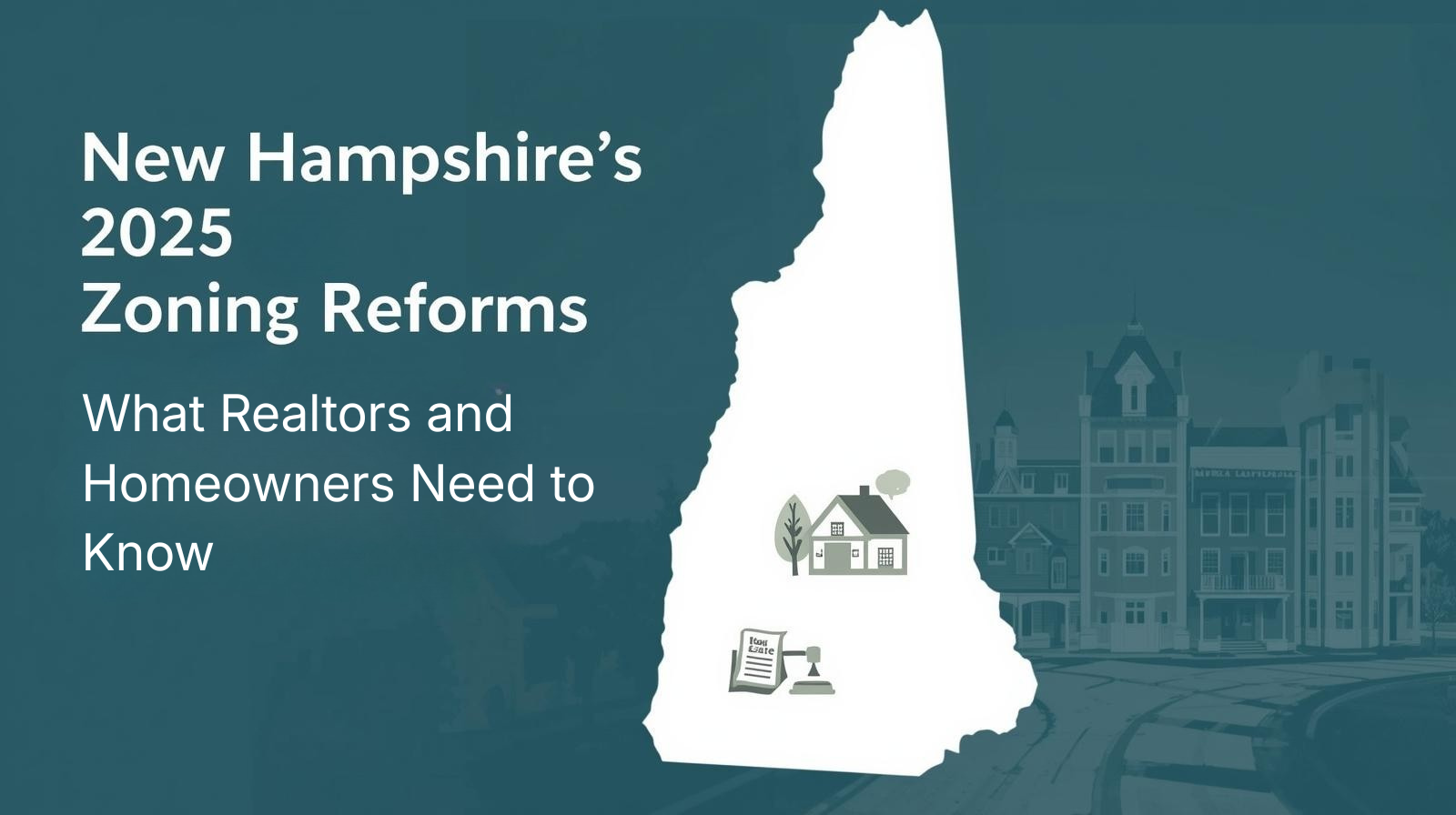New Hampshire quietly passed some of the most meaningful housing reforms in the region this year — changes that could reshape development patterns, expand homeowner flexibility, and shift the way communities grow over the next decade. And while these reforms are designed to ease the state’s affordability crisis, they’ve also sparked tension at the local level, with some officials and residents pushing back.
If you’re a realtor, investor, or homeowner, these changes aren’t just political news — they directly affect how and where housing can be built in the Granite State.
A Big Move Toward “Pro-Housing” Policy
In 2025, lawmakers approved a package of zoning reforms aimed at boosting the state’s limited housing supply. According to reporting from New Hampshire Public Radio (NHPR), the new laws do three major things:
- Limit local parking minimums
Many towns have long required new residential developments to include specific amounts of off-street parking. The new rules prevent municipalities from using those requirements to block or restrict housing — especially in areas where parking limits were acting as a de facto cap on development. - Require many municipalities to allow housing in certain commercial zones
This is a big change. It opens the door for mixed-use redevelopment, conversions of older commercial spaces, and infill housing in areas traditionally dominated by retail or office use. This allows for underused plazas, aging strip malls, or oversized commercial lots suddenly becoming viable residential opportunities. - Expand Accessory Dwelling Units (ADUs)
Municipalities must now allow more ADUs “by right,” meaning the approval process is simpler and less discretionary. Homeowners who once faced numerous hurdles to build an in-law suite, garage apartment, or backyard cottage may now find the process more accessible.
Collectively, these reforms aim to create more pathways to new housing — an urgent need in a state where inventory remains tight and affordability continues to erode.
Not Everyone Is Happy
Despite their housing-friendly intentions, the reforms have triggered backlash in several communities. Some local officials argue the state is overstepping by reducing local control, and they’re concerned about infrastructure limits, rural character, and increased service demands.
NHPR reports that several lawmakers have already introduced bills to scale back, amend, or even reverse some of the zoning changes — setting up what could become a long-running political tug-of-war between state-level housing strategies and local autonomy.
For realtors, these changes are worth paying attention to. Rules may shift again in future legislative sessions, especially if organized opposition gains momentum.
What This Means for Realtors
These reforms aren’t just policy tweaks — they create new opportunities:
More Infill and Mixed-Use Projects
With housing allowed in commercial zones, properties that once had limited value in a residential context may now be redevelopment candidates. Investors may look at older commercial buildings with fresh eyes, and sellers may discover untapped potential in parcels that weren’t previously “housing eligible.”
More Duplexes, ADUs, and Small Multi-Family Opportunities
The ADU expansion is especially promising. A simpler approval process means more homeowners will be open to adding rental units, creating multi-generational spaces, or boosting equity with income-producing additions.
Realtors who educate clients about these new possibilities can differentiate themselves quickly — especially as demand for flexible living options grows.
A More Nuanced Inventory Story
While these reforms won’t fix the housing shortage overnight, they signal that the state is actively pushing for more units. Realtors should be ready for gradual shifts: more small-scale construction, more redevelopment of existing spaces, and potentially more listings tied to ADU-capable properties.
What This Means for Homeowners
For homeowners, the changes could be personally meaningful.
ADUs Now More Accessible
Whether you’re thinking about caring for aging parents, helping adult children, or creating passive rental income, the new ADU flexibility opens doors that were previously difficult to unlock. For some households, this could be financially transformative.
Property Values Could Benefit
Properties in zones newly open to residential use may see increased demand. Even if you have no plans to build, expanded development rights can boost long-term value.
More Options for Downsizing or Staying Put
With legal and financial barriers lower, homeowners may find it easier to reconfigure their properties rather than move — especially helpful given the current mortgage-rate lock-in environment.
A Turning Point for NH’s Housing Future
New Hampshire’s 2025 zoning reforms are the state’s most assertive effort yet to address its housing shortage. They won’t solve affordability issues alone — but they pave the way for more creative, flexible development that simply wasn’t possible before.
Real estate professionals who stay informed and adapt early will have an advantage as the market adjusts. And homeowners who take the time to understand their new rights may uncover opportunities that were previously out of reach.
As the state debates the reforms — and potential rollbacks — this will remain one of the most important housing stories to watch heading into 2026.


